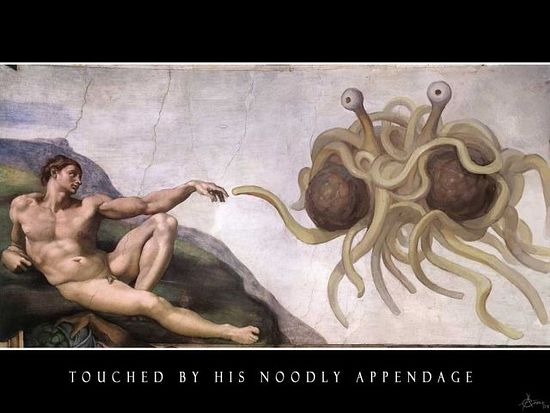Source: arstechnica.com
April 15, 2016
A Nebraska inmate who has professed his allegiance to the divine Flying Spaghetti Monster lost his bid demanding that prison officials accommodate his Pastafarianism faith.
A federal judge dismissed the suit Tuesday brought by Stephen Cavanaugh, who is serving a 4- to 8-year term on assault and weapons charges at the Nebraska State Penitentiary. US District Judge John Gerrard ruled that "FSMism" isn't a religion like the ones protected under the Constitution.

For the uninitiated, Judge Gerrard gives some explanatory background on Pastafarianism:
FSMism is a riposte to intelligent design that began with a letter to the Kansas State Board of Education when it was considering intelligent design. See, Bobby Henderson, The Gospel of the Flying Spaghetti Monster 111-13 (2006) (FSM Gospel). The primary criticism of intelligent design—and the basis for excluding it from school science classes—is that although it purports to be "scientific," it is actually "an interesting theological argument" but "not science." Kitzmiller, 400 F. Supp. 2d at 745-46. The conceit of FSMism is that, because intelligent design does not identify the designer, its "master intellect" could just as easily be a "Flying Spaghetti Monster" as any Judeo-Christian deity—and, in fact, that there is as much scientific evidence for a Flying Spaghetti Monster as any other creator. See FSM Gospel at 3-4. 1 As the FSM Gospel explains, "[w]e are entering into an exciting time, when no longer will science be limited to natural explanations. . . . Propelled by popular opinion and local government, science is quickly becoming receptive to all logical theories, natural and supernatural alike."
In his lawsuit, the inmate sought $5 million and claimed he has "several tattoos proclaiming his faith" and demanded that prison officials afford his "faith" the "ability to order and wear religious clothing and pendants, the right to meet for weekly worship services and classes and the right to receive communion." Corrections officials determined FSMism was a parody religion and rejected his requests. (The religious clothing at issue is "a pirate costume," the judge notes.)
According to the ruling:
This is not a question of theology: it is a matter of basic reading comprehension. The FSM Gospel is plainly a work of satire, meant to entertain while making a pointed political statement. To read it as religious doctrine would be little different from grounding a "religious exercise" on any other work of fiction. A prisoner could just as easily read the works of Vonnegut or Heinlein and claim it as his holy book, and demand accommodation of Bokononism or the Church of All Worlds. 6 See, Kurt Vonnegut, Cat's Cradle (Dell Publishing 1988) (1963); Robert A. Heinlein, Stranger in a Strange Land (Putnam Publ'g Grp. 1961). Of course, there are those who contend—and Cavanaugh is probably among them—that the Bible or the Koran are just as fictional as those books. It is not always an easy line to draw. But there must be a line beyond which a practice is not "religious" simply because a plaintiff labels it as such. The Court concludes that FSMism is on the far side of that line.
Nebraska, in seeking to have the case dismissed, told the judge that there was no constitutional violation. "The essence of this action," the state wrote, "is that prison officials believe the Plaintiff is not sincere in his religious beliefs about a flying lump of spaghetti that first created 'a mountain, trees, and a midget.'"




